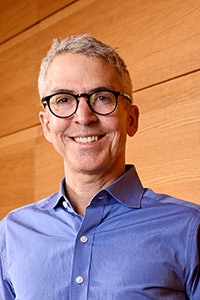Many experts believe that the Biden administration’s plan for student loan forgiveness, which offers $10,000 of debt relief to most borrowers and $20,000 to Pell Grant recipients, is dead in the water at the conservative-dominated Supreme Court. Diverse readers aren’t more optimistic, with nearly 2/3 predicting that the policy would be terminated in a recent poll. But a recent amicus curiae brief filed by two conservative law professors might offer Republican-appointed justices a reason to issue a surprise decision.
Like many conservatives, the brief’s authors, Samuel L. Bray, the John N. Matthews Professor at Notre Dame Law School, and William Baude, a professor at the University of Chicago Law School, don’t believe that President Joe Biden has the authority to cancel student debt. But they also don’t believe that many of the plaintiffs have standing—the experience of direct harm that would give them the right to sue in the first place.
 Michael San’Ambrogio, professor and senior associate dean for faculty and academic affairs at Michigan State University
Michael San’Ambrogio, professor and senior associate dean for faculty and academic affairs at Michigan State University
Several of the states involved in the cases are claiming that they will experience harm from a loss of fees that would have been paid to student loan servicers. Baude and Bray focus on the most prominent of these, Missouri and the Missouri Higher Education Loan Authority (MOHELA). Missouri claims that MOHELA is synonymous with the state and that a projected decrease in funds would prevent MOHELA from making legally required payments into a state fund.
Baude and Bray reject this, arguing that MOHELA is distinct from the state of Missouri legally and financially. They point out that MOHELA has the ability to sue and be sued. (Indeed, if MOHELA itself was the plaintiff in this Supreme Court case, it would likely have standing, the authors say.) Baude and Bray further argue that whether decreased revenues will cause MOHELA to miss a payment to the state fund is speculative and that MOHELA is likely to miss their payment anyway for reasons unrelated to loan forgiveness.
The brief also tackles other arguments that states have made, like that loan forgiveness would decrease tax revenue or harm the health and well-being of citizens. Baude and Bray counter that the states could alter their tax policies if they so choose.
San’Ambrogio believes that these arguments are powerful.
“[The case for standing] is really quite weak," he said. “The chain of causation is too attenuated. There are too many third parties.”
Baude and Bray argue that these types of lawsuits are part of a dangerous trend: state attorneys general claiming tenuous injuries to file lawsuits against every executive action from the opposite political party. They show that these sorts of suits have skyrocketed since 2007. The result, they say, is a warping of the appropriate role of federal courts, allowing unelected judges to have the final say over all major decisions from elected executives.
 Rebecca Natow, assistant professor of educational leadership and policy at Hofstra University
Rebecca Natow, assistant professor of educational leadership and policy at Hofstra University
“It’s an argument that strikes a lot of chords with people who are ideologically conservative,” she said. “It’s about judicial restraint.”
Indeed, some of the Supreme Court justices themselves have taken similar positions in the past.
“There are some conservative justices on the court, Roberts, Thomas, and Alito, who have taken a position that standing should not be overly broad,” said Natow.
The identities of the brief’s authors may also make a difference.
“I think the fact that it comes from law professors who identify as conservative and who stated right at the beginning of the brief that they don’t think the loan forgiveness policy is lawful makes it even more persuasive,” she said.
However, San’Ambrogio cautioned that previous rulings about standing may not apply.
“The Supreme Court is notoriously inconsistent in applying the rules of standing,” he said. “It will often grant standing when it wants to take a case and deny standing when it doesn’t.”
To this perspective, if the conservative justices feel strongly enough that loan forgiveness is an executive overreach, they might put any qualms about standing to the side.
It’s also possible that, even if justices agree with Baude and Bray’s standing arguments, they might still stop loan forgiveness using the claims of other plaintiffs. The Supreme Court has agreed to simultaneously hear the case of two borrowers from Texas who are claiming that they were harmed by the specific design of the program. Those plaintiffs might have an easier time showing standing, allowing justices to then rule on the merits of the case—which many predict will result in the end of forgiveness.
Although results in the cases are not expected until the end of June, there may be clues to whether Baude and Bray’s brief has been influential during oral arguments, which are scheduled for February 28th.
“If you see them focused on the issues and questions raised in this brief and if they raise those questions themselves and ask for responses by the states, that suggests it’s had some impact,” said San’Ambrogio.
Although it may be a long shot, San’Ambrogio and Natow agreed that arguments like the ones Baude and Bray have made present the likeliest route to an unexpected outcome.
“They make a good case that this is a more general problem,” said San’Ambrogio. “The arguments are pretty strong.”
Jon Edelman can be reached at [email protected].















